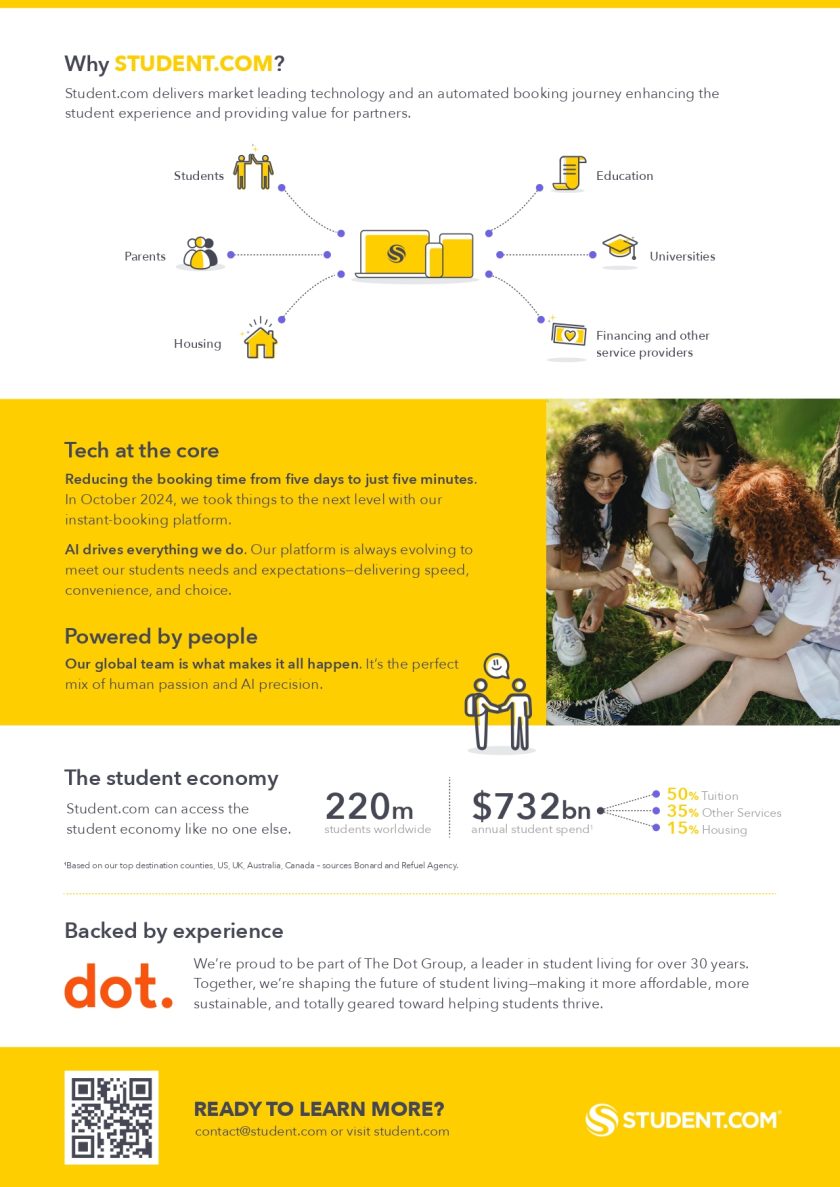If you are counting down to A levels results day ahead of going to university for 2022/23 then this is the guide for you. Covering everything of what you need to prepare – accommodation, making your choices to moving-in – it’s all in our A levels 2022 guide.
From picking your A levels subjects a few years back, to coursework and selecting your university options, it can seem like it has been a long journey just to get to this point. But we are here to help you and this guide covers everything you need to know.
Don’t forget to take advantage of our No Place No Pay offer. Book your first year accommodation today with peace of mind if your plans change. Keep an eye out for the No Place No Pay badge on the search results or property pages for participating properties and T&Cs. Booking one of these properties, you can cancel free of charge of you don’t get a place in the university you were expecting to go to.
What’s happening with A levels 2022?
GCSE, AS and A level exams will be going ahead as planned this summer. However, Ofqual has confirmed there will be a more generous grading approach for exams to take into account the ongoing impact of the COVID-19 pandemic on students. A levels results day 2022 is set for 18th August. This is the day when students in England will find out which university they will be going to.
What’s happening with universities for 2022/23?
Universities are looking to start the 2022/23 academic year as normal however there may be a continued blend of face-to-face learning for seminars, and online learning for lectures teaching. Each university is able to decide how best to provide teaching, so please refer to individual university websites for more information. At the moment it looks very likely that things will be more or less back to normal though.
Here are three things you need to consider
Student accommodation
Whether you’ve picked one university option or several, it’s never too early to start looking for your student accommodation. There are three types of accommodation in university cities: private student accommodation (PBSAs), private renting with landlords and university halls. Here’s a quick overview of each.
Private student accommodation
Also known as PBSAs (purpose-built student accommodations) this is the ultimate option in student accommodation. Built specifically with students in mind, they often boast great amenities like games rooms, in-house gyms and dedicated study spaces. They’re usually based close to a university and close to public transport. Rooms can be selected at booking, and you can also book in groups (if you know others heading to the same university and you want to flat share). Range of accommodation from shared rooms to private rooms with en-suite to fully self-contained studio apartments. Additional facilities on-site can include study spaces, gym, cinema room, laundry room and 24/7 staff. Monthly rent typically includes WiFi and all bills. You can use student finance. Tenancy agreements are often flexible and can range from a couple of months to a year.
Student.com lists some of the best private student accommodation in several UK cities, so check out what we have on offer in the city you’re headed to:
Private renting through landlords
Usually based in the same city but often further out depending on the area. You would typically need to find other people or have a group of friends to share with. You are usually responsible for handling bills directly with your housemates. You will have a set tenancy agreement length, usually one year.
University halls
Usually based on campus or close to a university. Rooms allocated by the university and in general you can’t pick which building you get, but you can make your preferences known. These are usually allocated after results day when universities have confirmed their conditional offers. You pay per term and you can use student finance. You will have a set tenancy agreement length, usually one year.
Making your choices
Heading to university means making a new local community and a network of friends, course mates and potentially work friends. It’s important to consider what style of living you like. If you are sociable, like to have everything on your doorstep and want to walk to the majority of places, try a busier city with a larger city centre. If you prefer to enjoy parks, countryside or the beach, it’s worth checking out university cities that match your interests.
When it comes to accommodation, similarly the way you like to live and spend your spare time makes a difference. Some private student accommodation properties have several buildings with a larger group of residents, whereas some are smaller with only a handful. Also, the range of facilities depends on each property, so it’s worth checking out student accommodation listings to see:
- How close to the university they are
- What communal space is available for you to use
- What support is available on-site – concierge and/or 24/7 team support
- What security measures are in place for peace of mind – CCTV and door entry pads for example
You can search for student accommodation on Student.com and book today using the No Place No Pay guarantee. This means if you don’t get your place at university then you will get your money back, but you can take advantage of greater room availability and current offers by booking earlier. After results day places typically sell out very quickly. For more information speak to a member of the team today*.
The countdown to moving in
September may seem a while away but it will come around fast. Ahead of moving-in week it’s worth thinking about:
- Student finance applications – if you meet the criteria, have you applied? Usually there’s a timeframe for the application to be processed and set payment dates, so it’s worth getting that organised sooner rather than later.
- Bank/mobile phone accounts – there are student deals for bank accounts so take a look at what’s on offer to make sure you have everything sorted before heading to university. Similarly, some mobile operators provide student discounts.
- Storage – organising your belongings ready for the move can be started quite early with a clear out. Charities such as British Red Cross provide charity donation bags to your doorstep which you can drop at lots of drop-off points, not just in the stores. Plus consider what can be sold as every penny counts at university.
- Shopping list – it’s easy to get drawn into buying so many items for university which can more often than not double or triple up if you are living with flatmates as everyone will bring a chopping board set or a set of pans. That said it’s still worth getting the basics, which include:
- Duvet & pillows – easy to try and save on these but invest in a good set as a comfy nights’ sleep is priceless
- Mattress protector and topper – quick way to feel clean and fresh when you move in, plus a mattress topper can make the mattress more comfortable to your preference as they come in a range of fillings such as feather down, memory foam or hypoallergenic fibre filling.
- Homely touches – photo frames, fairy lights (battery operated) and scatter cushions. May seem extra before you have moved in but each touch of personalisation makes a difference so you can get settled sooner.
- Black-out blind – prefer pitch black sleeping? Don’t be woken at the crack of dawn by daylight by curtains or blinds you can’t change. Consider temporary black-out blinds made for babies as they simply stick on and can be taken off in the morning. No mess or fuss, just a dreamy nights’ sleep ahead of you.
So there it is, our guide to what’s ahead with A levels 2022 and for those heading to university for 2022/23. If you have any questions about anything, don’t hesitate to get in touch. Our team of experts are always ready to help!
*T&Cs apply, for more information contact the team at Student.com







